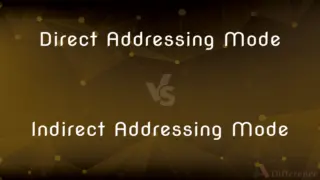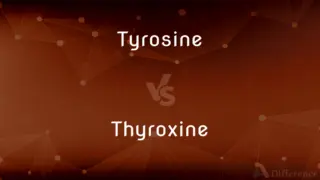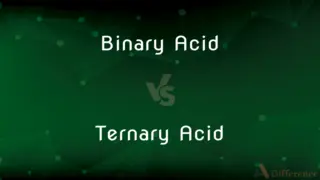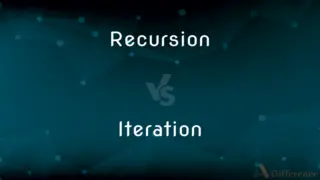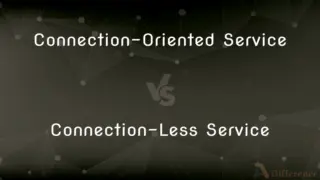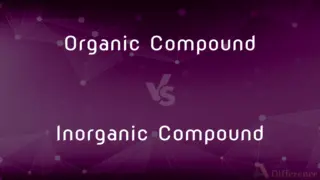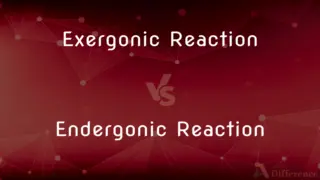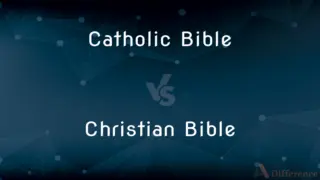Potentially vs. Possibly — What's the Difference?
By Maham Liaqat & Fiza Rafique — Updated on May 21, 2024
Potentially implies a likelihood or capability for something to happen, often with a sense of latent ability, while possibly indicates a chance or uncertainty that something might happen, focusing on feasibility without implying likelihood.

Difference Between Potentially and Possibly
Table of Contents
ADVERTISEMENT
Key Differences
Potentially refers to something that could happen based on its inherent qualities or capacities. It implies a latent ability or future possibility that could be realized under the right circumstances. Possibly, on the other hand, indicates that there is a chance or likelihood of something happening without any inherent implication of ability or capacity. It conveys uncertainty and openness to various outcomes.
Potentially often suggests a scenario where the possibility is more rooted in the capabilities or qualities of the subject. Possibly is used more generally to suggest that something might happen or be true, often without the same level of implication about underlying capabilities.
When discussing future outcomes, potentially suggests a condition that could develop given certain factors, whereas possibly simply indicates a chance. For instance, "This approach could potentially solve the problem" implies that the approach has the capacity to solve the problem, while "This approach could possibly solve the problem" suggests that solving the problem is one of the possible outcomes.
Comparison Chart
Definition
Likelihood based on capacity or capability
Chance or uncertainty without implying likelihood
Usage
Indicates latent ability or future possibility
Indicates feasibility or chance
ADVERTISEMENT
Context
Often used with inherent qualities or capabilities
Used more generally to express uncertainty
Examples
She could potentially win the award.
He might possibly call you later.
Implication
Implies inherent capacity or future realization
Does not imply inherent capacity
Compare with Definitions
Potentially
Having the capacity to develop into something in the future.
This startup is potentially a major industry disruptor.
Possibly
Used to denote something that might be true.
He is possibly the tallest person in the room.
Potentially
Involving a latent ability.
He is potentially a great leader, given the right opportunities.
Possibly
Indicating a chance of something happening.
The meeting might possibly be canceled.
Potentially
Suggesting something could happen if certain conditions are met.
The project could potentially be completed early.
Possibly
Expressing uncertainty.
She could possibly be the one who left the door open.
Potentially
Indicating a possible future event based on current conditions.
The new policy could potentially reduce emissions.
Possibly
Perhaps
He hesitated, possibly remembering his unsuccessful last attempt.
Potentially
Capable of being but not yet in existence; latent or undeveloped
A potential problem.
A substance with many potential uses.
Possibly
Conceivably
Could they possibly be here already?.
Potentially
(Grammar) Of, relating to, or being a verbal construction with auxiliaries such as may or can; for example, it may snow.
Possibly
Under any circumstances
I can't possibly do it.
Potentially
The inherent ability or capacity for growth, development, or future success
An investment with a lot of potential.
A singer who has the potential to become a major star.
Possibly
(modifying a clause or predicate) Perhaps; indicates that the proposition may be true (is not certainly false) regardless of any facts or circumstances known to, stated by or implied by the speaker.
Possibly, they will make gains in the midterm elections.
It was possibly the costliest mistake in the organization's history.
This rare and possibly unique specimen must be conserved.
Potentially
The possibility that something might happen or result from given conditions
A tense situation with the potential to turn into a riot.
Farming practices that increase the potential for the erosion of topsoil.
Possibly
(modifying a verb) In the realm of possibility; indicates that the action may successfully be performed (is not impossible) regardless of any facts or circumstances known to, stated by or implied by the speaker that might limit the performance.
I'm much stronger than you, so you can't possibly win.
I couldn't possibly be there on time.
I couldn't possibly cheat on my wife.
It seems unlikely, but, yes, they could possibly win even now.
The police don't know him, and the information they have leads them to think he could possibly have murdered his wife.
Potentially
See electric potential.
Possibly
In a possible manner; by possible means; especially, by extreme, remote, or improbable intervention, change, or exercise of power; by a chance; perhaps; as, possibly he may recover.
Can we . . . possibly his love desert?
When possibly I can, I will return.
Potentially
See gravitational potential.
Possibly
By chance;
Perhaps she will call tomorrow
We may possibly run into them at the concert
It may peradventure be thought that there never was such a time
Potentially
See magnetic potential.
Possibly
With a possibility of becoming actual;
Introducing possibly dangerous innovations
He is potentially dangerous
Potentially useful
Potentially
(Grammar) A potential verb form.
Possibly
In a manner or to a degree possible of conceiving;
Is it possibly true?
Potentially
In a manner showing much potential; with the possibility of happening in a given way.
Possibly
To a degree possible of achievement or by possible means;
They can't possibly get here in time for the funeral?
Potentially
(obsolete) Powerfully, strongly.
Possibly
Perhaps or maybe.
We could possibly go to the beach this weekend.
Potentially
With power; potently.
Possibly
Suggesting a feasible outcome.
The package could possibly arrive tomorrow.
Potentially
In a potential manner; possibly, not positively.
The duration of human souls is only potentially infinite.
Potentially
With a possibility of becoming actual;
Introducing possibly dangerous innovations
He is potentially dangerous
Potentially useful
Potentially
Used to describe something that could occur.
This medication is potentially life-saving.
Common Curiosities
Can potentially and possibly be used interchangeably?
Not always; potentially implies latent capability, while possibly indicates uncertainty.
What does potentially mean?
Potentially means having the capacity or capability for something to happen in the future.
How does potentially imply latent ability?
Potentially suggests that something has the inherent qualities or capacity to happen under the right circumstances.
Can you give an example using possibly?
"We could possibly go for a walk if the weather improves."
What does possibly mean?
Possibly means there is a chance or likelihood of something happening, indicating uncertainty.
Does possibly suggest likelihood?
It suggests a chance but does not imply any specific likelihood.
Can you give an example using potentially?
"This project is potentially groundbreaking."
How would you use potentially in a sentence about future outcomes?
"She could potentially become the CEO with her skills and experience."
Is potentially more definitive than possibly?
Yes, potentially often implies a more defined possibility based on capacity.
Is possibly more uncertain than potentially?
Yes, possibly expresses a general uncertainty without implying likelihood.
How does possibly express uncertainty?
Possibly indicates that there is a chance or likelihood of something happening without any certainty.
Does potentially suggest likelihood?
Yes, it often implies a greater likelihood based on inherent capacities.
How would you use possibly in a sentence about future outcomes?
"We might possibly see some rain tomorrow."
Can potentially refer to negative outcomes?
Yes, e.g., "This chemical is potentially harmful."
Can possibly refer to negative outcomes?
Yes, e.g., "The flight could possibly be delayed."
Share Your Discovery

Previous Comparison
Doody vs. Poop
Next Comparison
Legitimate vs. LegitimizeAuthor Spotlight
Written by
Maham LiaqatCo-written by
Fiza RafiqueFiza Rafique is a skilled content writer at AskDifference.com, where she meticulously refines and enhances written pieces. Drawing from her vast editorial expertise, Fiza ensures clarity, accuracy, and precision in every article. Passionate about language, she continually seeks to elevate the quality of content for readers worldwide.















